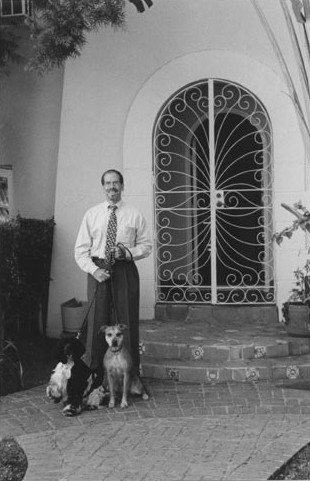Difference between revisions of "Bill Weinberger"
Rlschlittler (talk | contribs) |
|||
| Line 1: | Line 1: | ||
| − | + | ||
[[Image:Oewein.jpg|center|frame|Bill Weinberger, Charter Commission, Los Angeles, California. Photo by Ron Schlittler.]] | [[Image:Oewein.jpg|center|frame|Bill Weinberger, Charter Commission, Los Angeles, California. Photo by Ron Schlittler.]] | ||
| Line 52: | Line 52: | ||
<div style="text-align: right; direction: ltr; margin-left: 1em;"> | <div style="text-align: right; direction: ltr; margin-left: 1em;"> | ||
| − | Return to [[Out and Elected in the USA]] index • Go to [[Ken Yeager|next article]] | + | Return to [[Out and Elected in the USA: 1974-2004]] index • Go to [[Ken Yeager|next article]] |
</div> | </div> | ||
| − | For information on a touring exhibit version of ''Out and Elected in the USA'', contact Ron Schlittler at [mailto:rlschlittler@verizon.net rlschlittler@verizon.net]. | + | For information on a touring exhibit version of ''Out and Elected in the USA: 1974-2004'', contact Ron Schlittler at [mailto:rlschlittler@verizon.net rlschlittler@verizon.net]. |
| − | {{Curated Exhibit|exhibit name and link=[[Out and Elected in the USA | + | {{Curated Exhibit|exhibit name and link=[[Out and Elected in the USA: 1974-2004]]|firstname=Ron|lastname=Schlittler}} |
Latest revision as of 22:34, 11 April 2009
|
Bill Weinberger Born March 16, 1955 Charter Reform Commission Member, District 4 Los Angeles 275,000 constituents |
Career Overview Elected June 1997
|
Bill Weinberger's partner, author Michael Nava, wrote an essay titled "The Marriage of Michael and Bill" published in the anthology edited by John D. Preston, Friends and Lovers: Gay Men Write About the Families They Create.
Essay by Bill Weinberger for Out and Elected in the USA
The Elected Los Angeles Charter Reform Commission was one of two commissions that were established to re-write the 75-year old Los Angeles City Charter, the organic law by which the L.A. municipal government is structured and operated. Faced with growing disaffection by L.A. residents with their city government – most vividly expressed in a move by residents of the San Fernando Valley area of Los Angeles to secede, and a Charter that had been amended over 400 times, turning it into a intricate operations manual with power so dispersed that government could not effectively respond to the changing needs of the people – Mayor Richard Riordan pushed for a local initiative to establish an elected charter commission. The initiative passed overwhelmingly in April 1997.
Once I saw the field of candidates I would face, two of whom either had name recognition or major endorsements and financial resources; and knew how difficult it would be to explain to voters what I was running for, not to mention why they should vote for me; I decided not to raise any campaign funds, (I did not feel good about asking friends for financial support for a campaign in which I thought my chances were nil), and not to send any campaign literature. My strategy was to participate in all the candidates’ forums, focus on obtaining major newspaper endorsements, and have some fun. Both the Los Angeles Times and the L.A. Weekly endorsed me, and I won the April 1997 primary. I then hired an outstanding campaign manager, Sue Burnside, and fundraiser (Brian Rix/Pat Bradford), and ran in earnest.
Once elected, the other 14 commissioners and I had only two years to complete our work, reviewing the old charter, drafting a new charter, and coordinating our work with the competing commission that had been appointed largely by the City Council, many of whose members were opposed to Charter reform. It was a monumental task. We completed it successfully. Having worked through a conference committee to resolve differences between the Commission’s proposal and that of the other body, our proposed new charter appeared on the June 1988 ballot without a competing proposal which most likely would have spelled defeat for Charter reform.
I experienced the critical importance of running as an openly gay candidate for, and then serving as an openly gay member of an elected body. In candidate forums, I described the many diverse communities of Los Angeles to which I had ties and in which I had worked, and the lesbian and gay community was prominent among them. I represented all the members of my district, and the entire city as well, as an openly gay commissioner. When a gay man complained to the commission about how gays are treated in the City, and mistakenly stated that no one on the Commission represented the community, I could assure him that I, as well as some of my non-gay colleagues, had the community’s interests in mind. When a member of the public verbally attacked me during a commission meeting for the work I had done in the gay community, the most conservative member by far of the commission castigated him.
One of the heartening aspects of working on the Commission was that a few other commissioners wanted to carry the ball on including domestic partners and a non-discrimination provision in the Charter. Finally, as a commissioner, I was able to make sure that last minute glitches – such as the editorial deletion of a critical non-discrimination provision from the final version of the Charter proposal – were corrected.
Perhaps the most important lesson I learned as a commissioner is how many people really care and have good ideas for making government more responsive. It was an honor to contribute to the new Charter, which will govern the City well into the new millennium.
Return to Out and Elected in the USA: 1974-2004 index • Go to next article
For information on a touring exhibit version of Out and Elected in the USA: 1974-2004, contact Ron Schlittler at rlschlittler@verizon.net.
